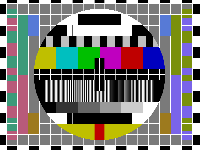Television
From The Art and Popular Culture Encyclopedia
|
“The Revolution Will Not Be Televised” --Gil Scott-Heron, 1970 "Television, the Drug of the Nation" --The Disposable Heroes of Hiphoprisy, 1992 See Amusing Ourselves to Death, vidiot, couch potato "Clive James was a television critic from 1972 until 1982. Selections from the column were published in three books — Visions Before Midnight, The Crystal Bucket and Glued to the Box – and finally in a compendium, On Television."--Sholem Stein "Larry King said he didn't mind being called the father of talk show democracy, even though a little over hundred people got to phone into his programme and ask the candidates questions."--Spin (1995) |
|
Related e |
|
Featured: |
Television is a widely used telecommunication system for broadcasting and receiving moving pictures and sound over a distance.
Since it first became commercially available from the late 1940s, the television set has become a common household communications device in living rooms, bedrooms and offices, particularly in the first world, as a source of entertainment and news. Since the 1970s, video recordings on VCR tapes and later, digital playback systems such as DVDs, have enabled the television to be used to view recorded movies and other programs.
In the 1950s television replaces radio as the dominant mass medium in industrialized countries, it nearly immediately becomes the scapegoat of the dumbing down - like so many new media before it - of our culture. By the late 1980s, 98% of all homes in the U.S. had at least one TV set. On average, Americans watch four hours of television per day. An estimated two-thirds of Americans got most of their news about the world from TV.
Contents |
Criticism and support
Criticism by Neil Postman and support by Camille Paglia.
Cultural pessimism and television
Three films that thematically deal with the dumbing down of man by television.
- Network (Dunaway comes while thinking of her TV ratings)
- Being There (videot, videocy)
- Fahrenheit 451 (books are forbidden, television omnipresent)
Television in Film
Being There (1979) Broadcast News (1987) Ed TV (1999), A Face In the Crowd (1957), Fahrenheit 451 (1966), Medium Cool (1969), Network (1976), Pleasantville (1998), Quiz Show (1994), To Die For (1995), The Truman Show (1998)
Films about television
- Videodrome (1983) - David Cronenberg
- "The television screen is the retina of the mind's eye. Therefore, the television screen is part of the physical structure of the brain. Therefore, whatever appears in the television screen emerges as raw experience for those who watch it. Therefore, television is reality, and reality is less than television."
- Deathwatch / La Mort en direct (1980) - Bertrand Tavernier
- The Cable Guy (1996) - Ben Stiller
- Network (1976) - Sidney Lumet
- Secret Cinema (1968) - Paul Bartel
See also
- Television culture
- Golden Age of Television
- Sex and the City
- Couch potato
- Cult television
- Semiotic democracy
- Cult television
- Quality television
- Television studies
- Criticism of television
- Television culture
- Adam Curtis


